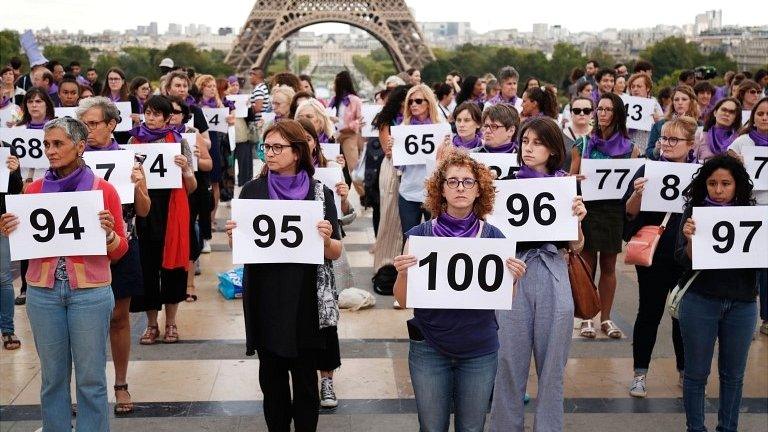France murder: Calls for action on guns after woman's street killing
- Published

Chahinez, 31, was killed by her husband
A women's rights group in France is calling on the government to remove guns from violent partners, after a brutal murder shocked the country.
Chahinez, a 31-year old mother-of-three, was shot and set alight by her husband, less than a year after he was sentenced for domestic violence.
She is the 39th woman to be killed by a partner or ex-partner this year.
The justice and interior ministries have launched an investigation into the case.
Hundreds gathered in Mérignac near Bordeaux on Wednesday evening, laying flowers and paying tribute to the victim.
"Horrified by this heinous crime, I extend my sincere support to the family of the victim," France's Minister for Citizenship Marlène Schiappa wrote on Twitter. "The fight against domestic violence and femicide continues."
The French rights group, La Fondation des Femmes (the Women's Foundation), says guns are used in a third of killings of women by current or former partners or family members.
"The law encourages police to confiscate weapons from the perpetrators of domestic violence. And for good reason: every year, a third of femicides are carried out using a firearm," the organisation said in a statement on Wednesday, referring to the killing of a woman by a current or former partner or a family member.
But the Women's Foundation said that its "repeated warnings" about guns in the hands of violent partners had been ignored by the interior ministry: "What we feared has therefore happened again."
What happened?
The prosecutor in Bordeaux revealed on Thursday that the suspect, 45-year-old Mounir B, had waited in a van outside his estranged wife's home all day before Tuesday's attack.
When he saw her in the street the same evening, he shot her twice in the legs. An autopsy showed that she was still alive when he poured flammable liquid on her body and set her alight.
He also threatened a neighbour who attempted to intervene.
Mounir B fled the scene and was arrested around 30 minutes later, the prosecutor said.
During the investigation, he said that he wanted to "punish" his wife but denied intending to kill her. He said he had obtained the weapons used in the attack from "illegal immigrants in town".
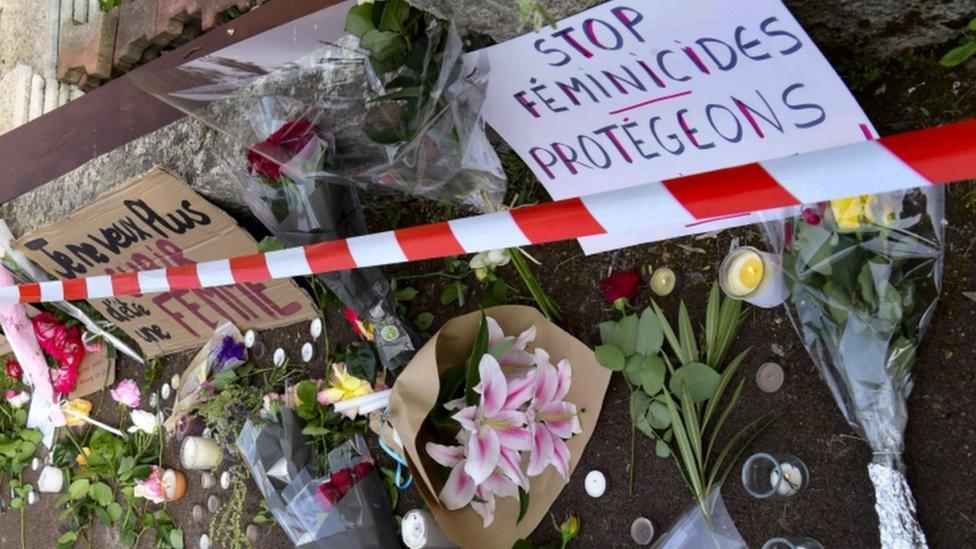
Tributes were left outside the woman's home
Chahinez came to France from Algeria in 2015 after marrying Mounir B. She had two children from a previous marriage and a five-year-old son with her second husband.
Last June, he was sentenced to 18 months in prison, half of which was suspended, on charges of domestic violence.
Under the terms of his release in December 2020, he was banned from contacting or approaching his former partner.
However, when she contacted police in March this year to report that she had been attacked by her husband, they were unable to locate him.
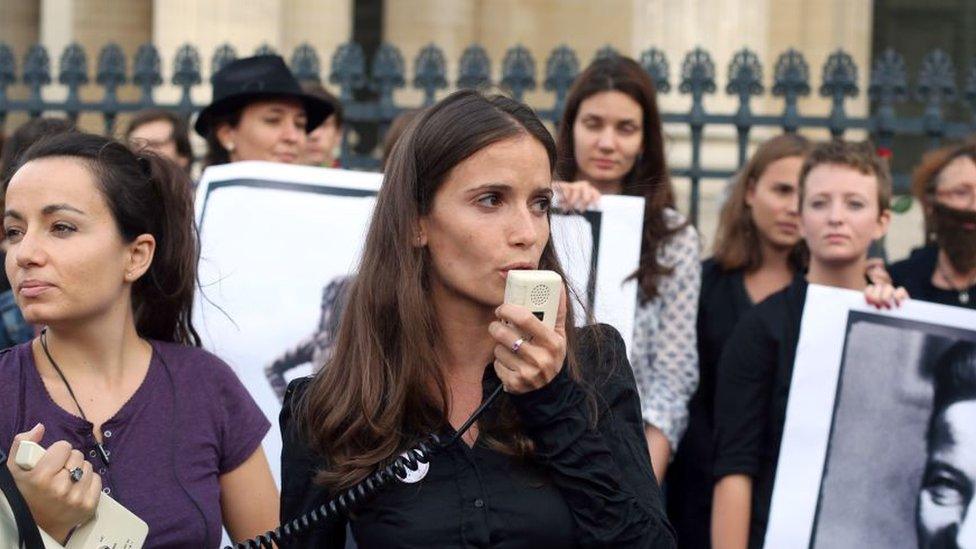
La Fondation des Femmes president Anne-Cécile Mailfert has called on the government to act
The Women's Foundation has raised questions about why Mounir B was not wearing an electronic tag at the time of the attack.
Anne-Cécile Mailfert, the organisation's president, told France Info that only around 40 electronic bracelets had been distributed during the previous year, despite the government approving their use to prevent violent partners from breaking restraining orders.
What is France doing to address violence against women?
The issue of femicide in France came to the fore in 2019, when thousands took the streets to protest the issue of gender-based violence.
A total of 146 women were killed by their spouse or partner that year, according to France's justice minister.
In response, the government introduced measures including more funding for emergency accommodation and increasing the protection for women at risk.
Last year, the number of women killed by their partner fell to 90, although rights groups say it is too early to determine whether the trend will continue.
Watch protesters turning Paris purple
What is the situation elsewhere in Europe?
In western Europe, France is said to be among the countries with the highest rate of women killed by their partner, with 0.18 victims per 100,000 women, according to Eurostat figures from 2017.
This compares with a rate of 0.13 in Switzerland, 0.11 in Italy and 0.12 in Spain, but is less than in Germany (0.23).
In 2019, Spain recorded the 1,000th murder of a woman by a partner since records began in 2003.
The country has developed a system of special courts reserved exclusively for cases of sexual violence against women.
All professionals, whether medics, police or judiciary are trained in dealing with conjugal violence. And police must register every complaint with judges required to deal with cases within 72 hours.

Help and advice
If you, or someone you know, have been affected by domestic abuse or violence, these organisations in the UK may be able to help.
In France: The "Violences Femmes Info" helpline can be reached on 3919
In Spain: 24-hour domestic violence helpline 016 and 24-hour helpline for women - (0034) 900 19 10 10

Related topics
- Published13 April 2020

- Published25 November 2019
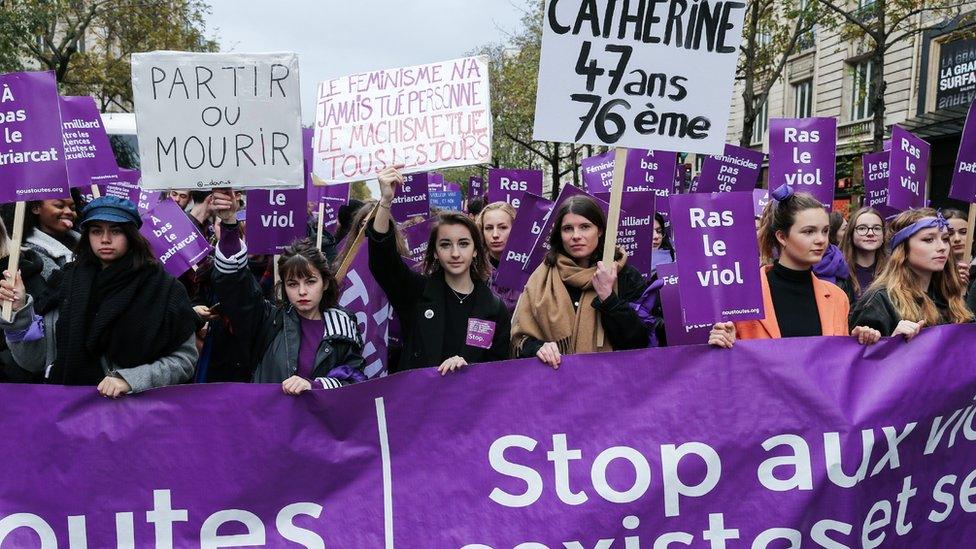
- Published7 September 2019
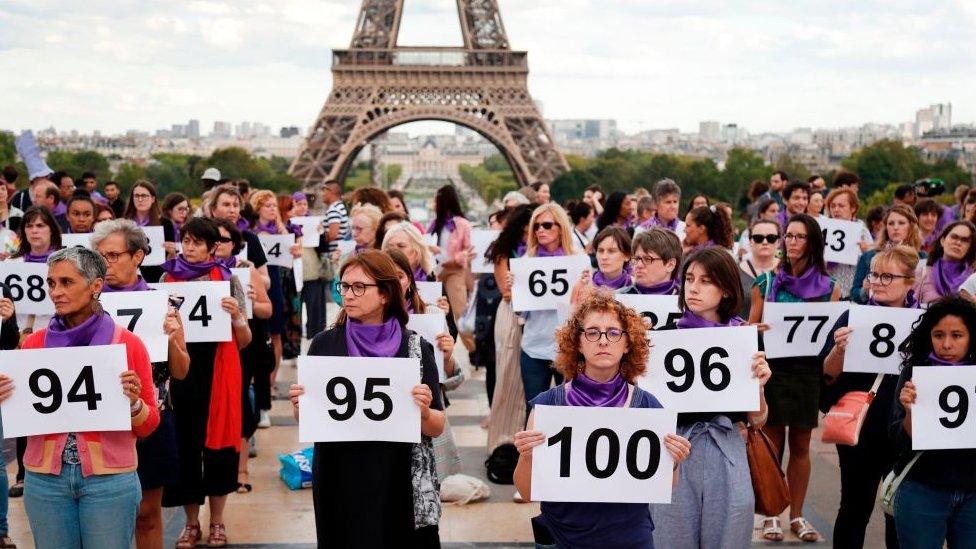
- Published3 September 2019
